



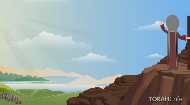 18:02
18:02
In this week's video, we close the entire Torah, and we ask ourselves, what lessons can we learn today? How can we be inspired by the Torah's messages, and fulfill our destiny as a people? .
Series: Aleph Beta: The Parsha Experiment
Immanuel Shalev (41)
 14:34
14:34
This book is about the Creator’s choice to teach us how we can come close to Him and achieve purpose in our lives. What will be its conclusion?.
Series: Aleph Beta: The Parsha Experiment
Immanuel Shalev (41)
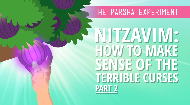 17:54
17:54
Last week, we found that to understand God's curses at the end of the Torah, we have to follow a trail all the way back, to Creation, and the Garden of Eden.
Series: Aleph Beta: The Parsha Experiment
Immanuel Shalev (41)
 14:48
14:48
God promises us dark, sadistic curses, if we don't live up to our responsibilities to Him. It's so difficult to read, how could He be so cruel to us? Join us as we grapple with the incredibly difficult curses of Ki Tavo.
Series: Aleph Beta: The Parsha Experiment
Immanuel Shalev (41)
 15:42
15:42
Last parsha, we began to suggest that all of these random laws are somehow related to the 10 commandments! But what is the larger message that this list of laws is coming to teach us?.
Series: Aleph Beta: The Parsha Experiment
Immanuel Shalev (41)
 13:12
13:12
If the entire book of Deuteronomy is supposed to be Moshe's rousing speech before the nation enters Israel, how can we understand the mundane text of Parshat Shoftim? Instead of inspiration, we hear law after law of seemingly trivial matters - witnesses, legalities, land boundaries
Series: Aleph Beta: The Parsha Experiment
Immanuel Shalev (41)
 17:31
17:31
God doesn’t like foreign gods....but does He have to remind us over and over? And the people, too, seemed to be obsessed with foreign gods. What made avodah zarah so attractive, and therefore so destructive, that God needs to devote law after law to its eradication? And what does any of this have to do with us, today?.
Series: Aleph Beta: The Parsha Experiment
Immanuel Shalev (41)
 16:18
16:18
In this week's parsha, Moses speaks, a lot - but it all seems so boring, and disconnected. The Torah is a book - and every sentence of that book fits together, like pieces in a puzzle. But how does that work, in this parsha? What is this parsha actually about?.
Series: Aleph Beta: The Parsha Experiment
Immanuel Shalev (41)
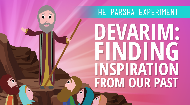 15:34
15:34
In Devarim, Moses gives a grand speech that at first glance seems like a boring history lesson with the least inspring stories! But underneath Moses' words is an unbelievable message that the nation of Israel needed to hear right before they enetered the land. What we come to find is that the messages of Moses speech are still applicable and inspriing to us, today
Series: Aleph Beta: The Parsha Experiment
Immanuel Shalev (41)
 16:36
16:36
Series: Aleph Beta: The Parsha Experiment
Immanuel Shalev (41)
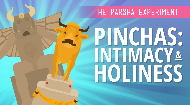 11:33
11:33
We've seent he people sin over and over, but it looks like last week, the people finally began to trust in God. But now, suddenly, idolatry? What happened? How did the people fail so quickly? Join us as we explore the perplexing story of Ba'al Peor.
Series: Aleph Beta: The Parsha Experiment
Immanuel Shalev (41)
 11:47
11:47
For the first time in a while, the main characters of this parsha are not the people of Israel. While the story of Bilaam and Balak are interesting, we wonder: the Torah isn’t an all-inclusive history book; why does the Torah tell us this story?.
Series: Aleph Beta: The Parsha Experiment
Rabbi David Block (31)
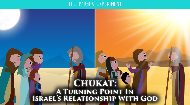 12:43
12:43
This week, we get even more complaining from Israel - this time, about the lack of water. How can they continue to complain after everything God had done for them? Join us as we explore the baffling story of Israel’s complaints.
Series: Aleph Beta: The Parsha Experiment
Rabbi David Block (31)
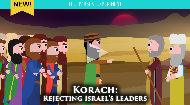 14:29
14:29
We’ve seen Israel complain over and over, but never before have they tried to undermine and dispose of their leaders. Join us as we make sense of Korach’s shocking complaints, this week on the Parsha Experiment.
Series: Aleph Beta: The Parsha Experiment
Immanuel Shalev (41)
 13:36
13:36
This week, we read about the tragic sin of the spies. It’s a very frustrating story. Every time we read it, just as the spies are about to give their report, we want to scream out, “NO - DON’T DO IT!” How could they have doubted God? How could they have sinned so egregiously?.
Series: Aleph Beta: The Parsha Experiment
Rabbi David Block (31)
 13:16
13:16
We've finally started traveling in the desert... and the people immediately complain? Did they suddenly forget that they had just been so close with God?? And how can we understand, and relate, to this seemingly ungrateful, chutzpadik nation?.
Series: Aleph Beta: The Parsha Experiment
Rabbi David Block (31)
 15:14
15:14
In Parshat Naso, we are introduced to what seems like a hodgepodge of miscellaneous laws. Why is the Torah bringing these up together? Join us as we explore something very subtle going on in this parsha.
Series: Aleph Beta: The Parsha Experiment
Rabbi David Block (31)
 14:08
14:08
Bamidbar should open with the stories of the desert, right? But instead, we are told of a census, the camp formation, and the Levites. Huh? Why is this the introduction to Bamidbar? In this week's video, we dive into the new role of the Levites, and see how it gives us a window into understanding our own responsibility, and our destiny.
Series: Aleph Beta: The Parsha Experiment
Immanuel Shalev (41)
 14:23
14:23
We suggested last week that death is the thread that ties the cases of tumah together. This week, in Metzora, we'll dive a little deeper to find the meaning embedded in the strange rituals of becoming tahor, ritually pure.
Series: Aleph Beta: The Parsha Experiment
Immanuel Shalev (41)
 11:16
11:16
In Parshat Tazria, we are introduced to the concepts of Tumah and Tahara. Some translate them as cleanliness and uncleanliness, some say ritual purity and impurity, but we never seem to get a clear and relevant understanding of what they actually are
Series: Aleph Beta: The Parsha Experiment
Immanuel Shalev (41)
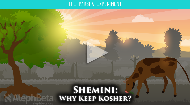 13:14
13:14
In this week's parsha, the Torah talks about one of the most impactful laws on the general lifestyle of the people of Israel - kosher animals. Have you ever considered WHY we're restricted from eating certain animals? And the specific laws - split hooves, chewing cud - seem totally arbitrary
Series: Aleph Beta: The Parsha Experiment
Immanuel Shalev (41)
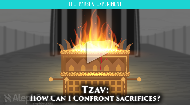 11:20
11:20
How can I, a modern day reader of the Torah, understand and relate to the concept of animal sacrifices, Korbanot? The ritual seems completely antiquated and barbaric to us today. And yet, Korbanot were a staple of Israel's service to God
Series: Aleph Beta: The Parsha Experiment
Immanuel Shalev (41)
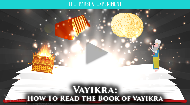 11:59
11:59
The book of Leviticus is tough - no narrative, and really difficult topics - for instance, how do we relate to holiness, purity and sacrifice in the 21st century? In this week's video for Vayikra (Leviticus 1:1-5:26), we will learn how to read the perplexing book of Leviticus.
Series: Aleph Beta: The Parsha Experiment
Immanuel Shalev (41)
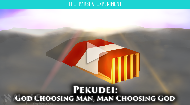 11:40
11:40
Parshat Pekudei (Exodus 38:21-40:38) is the conclusion of the book of Exodus. Exodus is known for Israel’s escape from Egypt, the sea splitting, the Ten Commandments, the Golden Calf, and the Tabernacle
Series: Aleph Beta: The Parsha Experiment
Immanuel Shalev (41)
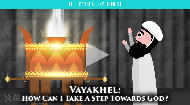 10:51
10:51
In Vayakhel (Exodus 35:1-38:20), we hear about the Mishkan’s construction, yet again! God just told Israel how to build the Mishkan and now we are given those exact details again as Israel actually builds it. But if you actually take a closer look at the text, you may find some subtle and significant differences
Immanuel Shalev (41)
 12:52
12:52
Is there ever a point of no return in my relationship with God? In Parshat Ki Tisa (Exodus 30:11-34:35), Moses explores this exact question as he bargains with God on behalf of the nation after the Sin of the Golden Calf. How is it possible that this lawyering session could possibly change God's mind after such an atrocious sin? What could this mean for me and my relationship with God?.
Series: Aleph Beta: The Parsha Experiment
Immanuel Shalev (41)
 12:39
12:39
In Parshat Tetzaveh (Exodus 27:20-30:10), God goes to great lengths to explain each specific detail for the Mishkan's structure and design. Obviously the details are more than just a means for beautification - there must be deep and meaningful significance for us all
Series: Aleph Beta: The Parsha Experiment
Immanuel Shalev (41)
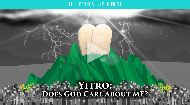 12:30
12:30
In Parshat Yitro (Exodus 18:1-20:23), we just witnessed some majorly epic events: the 10 plagues, the splitting of the sea and we're about to witness the ultimate epic event: God's revelation at Sinai. But smack in the middle of all of this awesomeness, we're introduced to Yitro, Moses' father-in-law
Series: Aleph Beta: The Parsha Experiment
Immanuel Shalev (41)
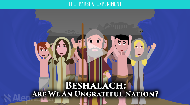 10:53
10:53
In Parshat Beshalach (Exodus 13:17-17:16) we're introduced to a nation of whiners and complainers. After years of slavery, the Israelites are finally a free nation! The next thing we should be reading is a love story between God and His people. But the honeymoon phase ends before it even begins
Series: Aleph Beta: The Parsha Experiment
Immanuel Shalev (41)
 12:38
12:38
In Parshat Bo (Exodus 10:1-13:16) we're finally freed from years of slavery! Mazal Tov! But before we get to the triumphant splitting of the sea, we read a whole section of laws relating to firstborn children and animals. Wait, what?! Can’t this wait until we're across the Sea?? Whats the deal with these laws and what can they teach us about the true meaning of the Exodus?.
Series: Aleph Beta: The Parsha Experiment
Immanuel Shalev (41)
 12:54
12:54
Epic speeches inspire us, but what if you're hearing the same epic speech over...and over...and over? That's what we seem to hear in God's speech to Moses in Parshat Va'era (Exodus 6:2-9:35)
Series: Aleph Beta: The Parsha Experiment
Immanuel Shalev (41)
 13:10
13:10
Everyone loves a good origin story - how did Anakin Skywalker become Darth Vader? Who was Peter Parker before Spiderman? In this video for Parshat Shmot (Exodus 1:1-5:23), we focus on Moses --- who was he before God appointed him as leader? How did Moses become Moses?.
Series: Aleph Beta: The Parsha Experiment
Immanuel Shalev (41)
 10:16
10:16
Rabbi David Fohrman (6)
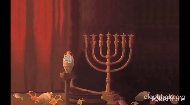 8:53
8:53
Rabbi David Fohrman (6)
 8:32
8:32
Rabbi David Fohrman (6)
 5:30
5:30
Rabbi David Fohrman (6)